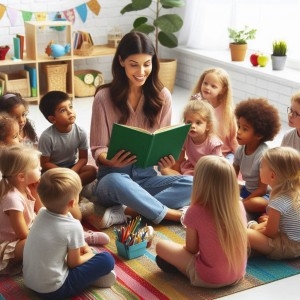International Music Day is on the 01st October. This day offers a powerful reminder that music is more than melody—it’s a language of connection, culture, and emotional expression. In early childhood settings, music becomes a bridge between generations, a tool for self-regulation, and a canvas for authentic child voice. Whether through spontaneous rhythm play, family-shared songs, or gentle lullabies, children experience music as a way to explore identity, build relationships, and express feelings beyond words.
Benefits of Music for Young Children
Cognitive Development
- Language & Literacy: Singing supports phonemic awareness, vocabulary growth, and rhythm of speech.
- Memory & Sequencing: Repetitive lyrics and musical patterns strengthen memory and cognitive processing.
- Numeracy Foundations: Rhythmic counting, beat patterns, and musical games introduce early math concepts.
Emotional Wellbeing
- Self-Regulation: Gentle music helps children calm, focus, and transition between activities.
- Emotional Expression: Music provides a safe outlet for feelings—joy, sadness, excitement, or frustration.
- Trauma Support: Predictable rhythms and soothing melodies can offer comfort and emotional safety.
Social & Relational Growth
- Connection & Belonging: Group singing fosters unity, turn-taking, and shared joy.
- Cultural Identity: Music from diverse backgrounds affirms children’s heritage and promotes inclusivity.
- Empathy & Perspective: Exploring songs about feelings or stories builds emotional literacy and compassion.
Creative & Physical Expression
- Movement & Coordination: Dancing to music enhances gross motor skills and body awareness.
- Imagination & Play: Musical storytelling and sound exploration spark creativity and symbolic thinking.
- Sensory Integration: Engaging with rhythm, pitch, and tempo supports sensory processing.
Activity Ideas
Cultural Soundscapes
-
Global Music Stations: Set up listening corners with music from different cultures—African drumming, Indian classical, Latin rhythms, Indigenous lullabies.
-
Family Contributions: Invite families to share songs from their heritage. Recordings, live performances, or even lyrics for sing-alongs can enrich the experience.
Child-Led Music Exploration
- Sound Discovery Baskets: Fill baskets with everyday objects that make interesting sounds—wooden spoons, rice shakers, rubber bands over boxes.
- Mini Music Makers: Encourage children to invent their own instruments and name them. Document their creations with captions that reflect their voice.
Emotional Expression Through Music
- Feelings Through Sound: Use music to explore emotions—play a slow, soft tune and ask “How does this music make your body feel?” Pair with drawing or movement.
- Calm Corners with Music: Create a restorative space with gentle instrumental music, soft lighting, and cozy textures for emotional regulation.
Interactive Performances
- Educator Jam Sessions: Let educators perform simple songs or rhythms—children love seeing familiar adults as musicians!
- Musical Storytelling: Turn a favourite story into a musical—add sound effects, rhythm breaks, or sing parts of the narrative.
Further Reading
Benefits Of Music and Movement
Using Music, Rhythm And Movement To Enhance Children's Self
Music Activities For Toddlers and Preschoolers
Bringing Aboriginal Music into the Early Learning Environment
How Music Enriches Brain Development In Children
Counting Guitar Strings
Musical Instruments Shadow Match
Musical Instruments Colouring Pages







 World Read Aloud Day (4th Feb) is a global celebration of the power of stories, voices, and connection. For early childhood services, it’s a perfect
World Read Aloud Day (4th Feb) is a global celebration of the power of stories, voices, and connection. For early childhood services, it’s a perfect